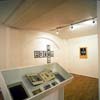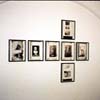thumbnails
(click on images to enlarge)
 1.installation view |
 2.detail - installation |
 3.detail |
| from the installation at the Museum of Modern Art, Oxford, England, 1997.
|
||
Axis: a tale of two stories |
1997 • Axis page 1 of 2 |
|---|
thumbnails (click on images to enlarge) |
|
|||||||||
|
|
|
|||||||||
Project description: Axis: a tale of two stories This installation is based on a discovery made by me in the mid-1990s in the Victoria and Alberta Museum Picture Library of the existence of several hundred "lost" photographs by the British photography pioneer, Roger Fenton. Fenton, who was the world's first "official" museum photographer - hired by the British Museum in the early 1850s - didn't actually work at the V & A (then called the South Kensington Museum) but his negatives were transferred there and printed after his departure from the British Museum in 1859. It was an ill-fated attempt to centralize photography resources for London museums at the South Kensington Museum. The project was abandoned and Fenton's negatives were sent back to the British Museum, where they were trashed at the end of the 19th century. The installation, Axis: a tale of two stories, addresses the interesting situation of Fenton's photographs at the V & A. In the institutional archives (the Picture Library) they functioned in their original form as museum documentation, while upstairs, in the collection of art photography, some of the |
same images could be found as part of Roger Fenton's "oeuvre" as an artist. The photographs in Axis are copied from the pages of the Picture Library's "Guard Books", the photographic records of the output of the museum's photo studio and are arranged in an axis form. The horizontal axis is made up of Fenton's museum artifact documentation, while the vertical axis is comprised of Fenton's work as "art" re-photographed by an anonymous museum photographer in 1939, the centenary of the announcement of photography to the world. The Guard Books, dating back to the first years of the photo studio in the 1850s, were discontinued and removed from the Picture Library in the late 1990s. |
|---|
| back to museology overview page |
|---|
| back to projects overview page |
| back to home page |